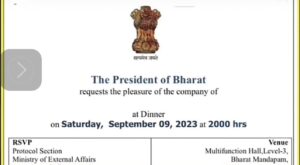India Considers Embracing Bharat as Official Name: A Historic Constitutional Debate Resurfaces
 The age-old discussion resurfaces as India contemplates adopting Bharat as its official name
The age-old discussion resurfaces as India contemplates adopting Bharat as its official name
 India, a nation steeped in history and cultural diversity, is once again revisiting the debate surrounding its official name. The Indian government is currently deliberating the possibility of adopting “Bharat” as the country’s official name, reviving a discussion that dates back to the drafting of the Indian Constitution.
India, a nation steeped in history and cultural diversity, is once again revisiting the debate surrounding its official name. The Indian government is currently deliberating the possibility of adopting “Bharat” as the country’s official name, reviving a discussion that dates back to the drafting of the Indian Constitution.
During the Constitutional Assembly’s deliberations, a committee was formed to determine the most appropriate name for the nation. Divided into two factions, one advocating for “Bharat” and the other for “India,” the committee found itself at an impasse. In a spirit of compromise, the Constituent Assembly ultimately decided to incorporate both names in the constitutional statement.
Now, decades later, the discussion has resurfaced, reigniting conversations about national identity and the significance of names in reflecting a country’s heritage. Proponents of adopting “Bharat” argue that it is a more culturally resonant and historically accurate name, rooted in ancient Indian traditions and mythology.
Advocates for the change believe that “Bharat” better represents the diverse linguistic and cultural tapestry of the nation, encompassing the multitude of regional identities that make up India. They argue that embracing this name would be a powerful symbol of inclusivity and recognition for the country’s rich heritage.
However, critics of the potential name change express concerns about the practical implications and potential confusion that may arise. They argue that “India” has become a globally recognized brand, and altering the name could lead to administrative challenges, diplomatic complications, and unnecessary expenses.
If the government decides to proceed with adopting “Bharat” as the official name, it would require a comprehensive process involving legal amendments, consultations with various stakeholders, and international recognition. The transition would also necessitate updating official documents, passports, currency, and other administrative procedures, presenting a significant logistical undertaking.
The potential adoption of “Bharat” as India’s official name has garnered attention both domestically and internationally. Neighboring nations and global partners are closely observing the developments, as a name change could have implications for diplomatic relations, trade agreements, and international perceptions of the country.
As the debate unfolds, it is crucial to consider the sentiments of the Indian people, the historical significance of both names, and the potential impact on the nation’s global standing. Any decision regarding the adoption of “Bharat” as the official name should be made with careful consideration and respect for India’s diverse cultural heritage.
India finds itself at a crossroads, grappling with questions of identity, representation, and the legacy of its past. The outcome of this debate will undoubtedly shape the nation’s future, leaving an indelible mark on its history and its place in the world.
